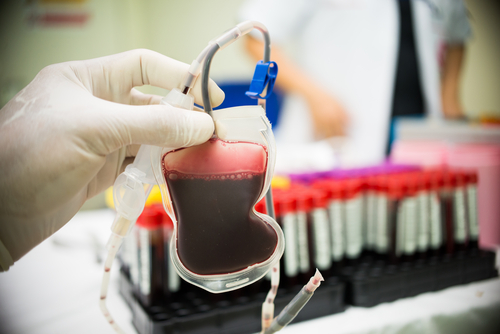Rifaximin, Oral Antibiotic, Named Orphan Drug for Potential to Ease Pain Crises
Written by |

The U.S. Food and Drug Administration (FDA) has designated rifaximin, an oral antibiotic, an orphan drug as a potential treatment of pain crises due to sickle cell disease (SCD), according to a press release.
A Phase 2 trial testing this antibiotic in SCD patients, in a new formulation for the blood disorder, is expected to open next year, Bausch Health Companies and its gastroenterology arm, Salix Pharmaceuticals, stated in the release.
Orphan designation is given to therapies with the potential to improve medical care for rare disorders, defined as those that affect fewer than 200,000 people in the U.S. It provides incentives to companies to further develop the treatment, including fee waives, trial protocol assistance, and seven years of marketing exclusivity upon approval.
SCD symptoms include bouts of extreme pain due to sickle-shaped red blood cells clumping together and clogging small blood vessels. These episodes, called vaso-occlusive crises (VOC), are common and represent the main cause for a hospital admission among people with SCD.
Activated and aged neutrophils, a kind of immune cell, are known to participate in these crises. Research has shown that elevated amounts of these cells are likely related to intestinal damage, and an abnormal gut microbiota in SCD patients.
The collection of bacteria in the gut helps to regulate many functions in the body, including inflammatory processes. Changes in the type and amount of bacteria in the gut microbiota may significantly impact these processes, and activate damaging immune cells.
Rifaximin is an antibiotic commonly used to treating traveler’s diarrhea and other intestinal diseases. By shifting intestinal bacteria toward a greater abundance of ‘good’ bacteria, the medication is expected to lessen neutrophil activation, possibly lowering the frequency and severity of VOCs.
A Phase 2 clinical trial (NCT03719729) that opened in 2018 investigated whether rifaximin could reduce the frequency of hospital admissions due to painful VOCs in SCD patients. Researchers presented data from 12 patients, a median age of 29, given rifaximin at 550 mg twice a day for six months.
Rifaximin’s use was seen to significantly ease intestinal injury and reduce inflammatory markers, including the amount of aging and activated neutrophils in blood circulation.
These changes, in a separate study, were reported to lead to clinical benefits, namely a reduction in VOC in this patient group.
In the year before entering the trial, these people experienced a median of 4.5 crises, and needed intravenous opioids to treat their pain for a median of 25.5 days — but some patients relied on them for 198 days, equivalent to 6.5 months.
Over the six months of rifaximin’s use, a median of one attack was reported, and the median number of days these patients needed opioids for pain dropped to nine — a median reduction of 82%. Their well-being also improved significantly, and the medication was well tolerated.
Bausch Health is now planning to launch a new Phase 2 trial, testing a novel formulation of rifaximin as an SCD treatment. The study is expected to open early next year.
“Early data suggests that rifaximin may be beneficial in reducing vaso-occlusive crisis in patients with sickle cell disease, and we are currently finalizing trial protocols to further evaluate its potential in this patient population,” said Joseph C. Papa, chairman and CEO of Bausch Health.
“We expect to start a Phase 2 trial … and we are hopeful to be able to bring this investigational oral formulation forward to help sickle cell patients,” added Papa.
Rifaximin, under the brand name Xifaxan, is approved to treat adults with diarrhea and abdominal pain due to irritable bowel syndrome in the U.S.





